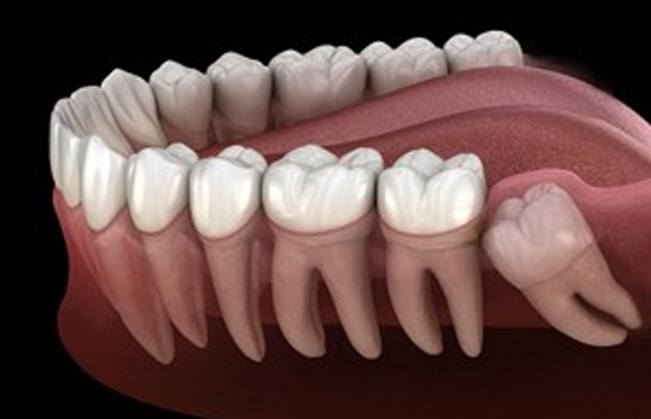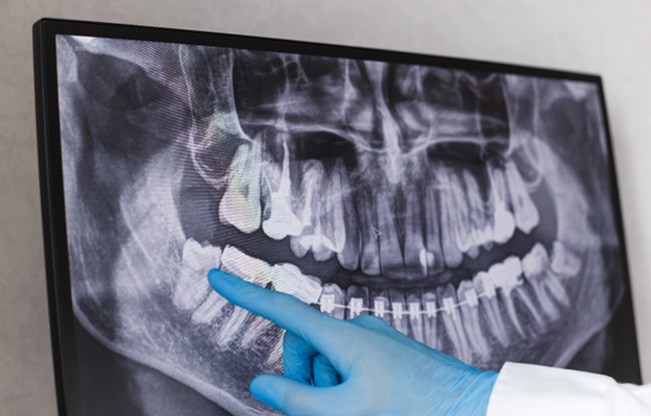Wisdom Tooth Extractions – Kent, WA
Safely & Gently Remove Problematic Third Molars

The wisdom teeth, also known as the third molars, are usually the last teeth to come in, erupting in the late teens and early twenties. In some people, these teeth cause no problems, but in many others, they can lead to severe oral health issues unless they are not removed. If you or your child are experiencing pain in the back of the mouth or jaw, then problematic wisdom teeth might be to blame. At Complete Dental Care, our dentistry team has the training to perform safe, gentle wisdom tooth extractions in Kent, WA without having to refer patients to an unfamiliar specialist. Contact us today to learn more!
Why Do Wisdom Teeth Need to Be Removed?

Most people simply do not have enough room in the jaw to accommodate wisdom teeth. As a result, these molars can become impacted, or stuck, in the gums since there is not a clear path for them to erupt. They often push against the gums and teeth, causing consistent pain toward the back of the jaw. Additionally, these teeth can come in at awkward angles – sometimes even sideways! Left untreated, they can push other teeth out of alignment and even lead to infections. Rather than letting it get that far, our emergency dentist in Kent, WA typically recommends wisdom teeth removal at the first sign of trouble.
What Can I Expect During a Wisdom Tooth Extraction?

Unlike many general dentists, we can perform many oral surgery procedures like wisdom teeth extractions right here in our dental office. This saves you time, money, and the stress of getting dental work done from a doctor you barely even know. You can stay right here with our trusted team throughout the whole process!
In most cases, you’ll be given sedation to help you relax before and during the procedure. Once your mouth is numb and you’re sufficiently sedated, we make incisions in your gums to access the wisdom teeth. If the teeth are impacted, we may need to break up the teeth and some of the surrounding bone into smaller pieces and remove them one at a time. Then, the site is cleaned, the wound is stitched up, and gauze pads are placed over the area to control bleeding and help with blood clotting.
Of course, you probably won’t remember much of the procedure itself. That’s why we recommend that a friend or family member drive you to and from your appointment. We’ll also explain your aftercare instructions to them.
Caring for Your Mouth After a Wisdom Tooth Extraction

We’ll provide you with a set of guidelines for wisdom tooth recovery, but here is a basic outline of what that might look like:
- Change out the gauze pads we placed over the extraction sites every 30 minutes or so for the next several hours.
- Spend the rest of the day resting. Patients can often return to work the next day, but strenuous exercise should be avoided for the next week.
- Drink plenty of water, but do NOT use a straw. It could dislodge the forming blood clot, delaying healing and causing extreme pain.
- Eat soft foods and avoid anything hot or spicy for the first two or three days.
- Take any prescribed painkillers or antibiotics as directed.
- For the first week, rinse your mouth with warm saltwater after every meal and every couple of hours. However, do NOT spit forcefully.
- Be careful when brushing near the extraction site.
- Refrain from smoking, chewing tobacco, and drinking caffeinated, sugary, and alcoholic beverages for the first several days.
Wisdom Tooth Extraction FAQs

When you’re told that it’s time to have your wisdom teeth removed, you might find yourself wondering what to expect during and after the procedure. Part of our goal is to ensure that our patients are fully educated about their dental care, so if you have any questions or concerns about wisdom tooth extraction, feel free to let us know. Here are some brief yet helpful answers to some of the questions that we’ve heard most often regarding this procedure.
Why Do We Have Wisdom Teeth?
Early in human history, wisdom teeth actually served a purpose. Our ancestors ate raw meat, roots, nuts, and other coarse foods. Since they didn’t cut up or cook their meals, they needed broader, stronger jaws to handle the things they ate – hence the necessity for wisdom teeth.
Of course, nowadays the way modern food is prepared makes it softer and easier to eat, and as such wisdom teeth are no longer needed. And due to how the human jawbone has evolved, oftentimes there’s not enough room for third molars in our mouths, which is why extraction is often necessary.
How Long Does Wisdom Tooth Extraction Take?
It usually takes around 15 to 20 minutes to remove a single wisdom tooth. Hence, a procedure where all four wisdom teeth are extracted can take up to 90 minutes. Of course, there are several variables that can affect the timeline, including the location of the tooth, its position, and whether or not it’s partially or fully impacted. We can give you an accurate estimate of how long we expect the extraction to take during your initial visit.
How Can I Prepare for Wisdom Tooth Extraction?
Our team can give you more specific instructions during your initial consultation, but usually, you’ll need to take the following preparatory steps:
- Get a trusted friend or family member to drive you to and from your appointment, and have them keep an eye on you for at least the first few hours of recovery following the procedure.
- Let us know what medications you take so that we can avoid unwanted interactions.
- Make sure that you have plenty of soft and liquid foods at home so that you can maintain a healthy diet while you’re recovering.
Does Wisdom Tooth Extraction Hurt?
The first step of wisdom tooth extraction is to use a local anesthetic to numb your mouth. As such, you won’t experience any discomfort during the surgery. There might be some slight pressure, but you generally won’t need to worry about outright pain.
Of course, once the numbness in your mouth wears off, it’s normal to experience some soreness or general discomfort in the days following your surgery. The discomfort should be manageable, especially if you follow our aftercare instructions. That said, if the pain becomes intense, or if it doesn’t fade away when it’s supposed to, we encourage you to call our office immediately.

